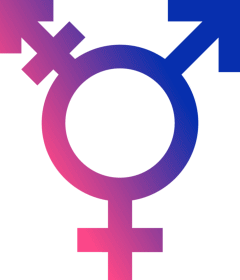
Sex–gender distinction
While in ordinary speech, the terms sex and gender are often used interchangeably,[1][2] in contemporary academic literature, the terms often have distinct meanings, especially when referring to people. Sex generally refers to an organism's biological sex, while gender usually refers to either social roles typically associated with the sex of a person (gender role) or personal identification of one's own gender based on their own personal sense of it (gender identity).[3][4][5][6] Most contemporary social scientists,[7][8][9] behavioral scientists and biologists,[10][11] many legal systems and government bodies,[12] and intergovernmental agencies such as the WHO[13] make a distinction between gender and sex.
In most individuals, the various biological determinants of sex are congruent, and sex is consistent with the individual's gender identity,[14] but in rare circumstances, an individual's assigned sex and gender do not align, and the person may be transgender.[3] In very rare cases, an individual may have sex characteristics that complicate sex assignment, and the person may be intersex.
Though sex and gender have been used interchangeably at least as early as the fourteenth century, this usage was not common by the late 1900s.[15] Sexologist John Money pioneered the concept of a distinction between biological sex and gender identity in 1955.[16][17] Madison Bentley had already defined gender as the "socialized obverse of sex" a decade earlier, in 1945.[18][19] As originally conceived by Money, gender and sex are analysed together as a single category including both biological and social elements, but later work by Robert Stoller separated the two, designating sex and gender as biological and cultural categories, respectively. Before the work of Bentley, Money and Stoller, the word gender was only regularly used to refer to grammatical categories.[20][21][22][23]
Sex
Dictionary definitions
The Oxford English Dictionary defines sex as "Either of the two main categories (male and female) into which humans and many other living things are divided on the basis of their reproductive functions;".[24] A further annotation exists on a separate definition stating that "The word sex tends now to refer to biological differences, while gender often refers to cultural or social ones."[24]
Merriam-Webster defines sex as "either of the two major forms of individuals that occur in many species and that are distinguished respectively as female or male especially on the basis of their reproductive organs and structures." or "the sum of the structural, functional, and sometimes behavioral characteristics of organisms that distinguish males and females". They also note that "[d]octors can alter the physical characteristics of sex, but bodily sex does not determine gender."[25]
Biologists
Anisogamy, or the size differences of gametes (sex cells), is the defining feature of the two sexes.[26][27][28][29] According to biologist Michael Majerus there is no other universal difference between males and females.[30]
By definition, males are organisms that produce small, mobile gametes (sperm); while females are organisms that produce large and generally immobile gametes (ova or eggs).[31][32][33][34] Richard Dawkins stated that it is possible to interpret all the differences between the sexes as stemming from this single difference in gametes.[35]
Bhargava et al. note that the terms sex and gender are not, and should not be used as, interchangeable terms. They state that "[s]ex is dichotomous, with sex determination in the fertilized zygote stemming from unequal expression of sex chromosomal genes." In contrast, gender is seen as including "perception of the individual as male, female, or other, both by the individual and by society".[36] The authors differentiate between sex differences, caused by biological factors, and gender differences, which "reflect a complex interplay of psychological, environmental, cultural, and biological factors".[14] Gender identity is thus seen as a "psychological concept that refers to an individual's self-perception".[14]
Other studies have noted that, while there is some tentative evidence for a potential genetic, neuroanatomical, and hormonal basis for gender identity, the specific biological mechanisms involved have not yet been demonstrated.[37]
Institutional and governmental use
U.S. Census
The United States Census Bureau performs a census of the U.S. population every ten years. The questionnaire asks one question about sex, phrased as "What is person 1's sex?" and provides two checkboxes for the response, labeled "Male" and "Female".[84] An explanatory page explains this question, using the term sex: as "We ask one question about a person's sex to better understand demographic characteristics."[84] The U.S. Census has had a question about sex on the census since the 1790 census.[84] The U.S. Census recognizes the difference between the terms sex and gender, the fact they are often confused or used interchangeably, and may differ across cultures and time, and explains that what the census attempts to measure, is "the sex composition of the population". [85]
Australian government
The Australian government provides guidelines on sex and gender to the public based on legislation passed in 2013. The guidelines recognize that "individuals may identify as a gender other than the sex they were assigned at birth, or may not identify as exclusively male or female".[86][87][88] The Australian Bureau of Statistics (ABS) gathers data about the population broken down in various ways, including by sex and gender. They require precise formulations of these terms, and go into some detail about sex recorded at birth, possible changes in sex assignment later in life, the meaning of gender and how it differs from sex. ABS recognizes the popular confusion among the two terms, and provide descriptions of how to phrase surveys so as to elicit accurate responses for the purposes of the data they collect.[89]
The government of the state of Western Australia recognizes a clear distinction between sex and gender providing a nuanced definition of each, including complications involved in sex beyond just sex assigned at birth, and the socially constructed nature of gender, including possible non-binary aspects.[90]
Limitations
Inseparability of biological and cultural factors
Some psychologists[117] have argued that the distinction between the terms "sex" and "gender" should be abandoned. The term "gender/sex" has been proposed, to emphasise the inseparability of biological and cultural factors.[118][119]
Diane Halpern, in her book Sex Differences in Cognitive Abilities, argued problems with sex vs. gender terminology: